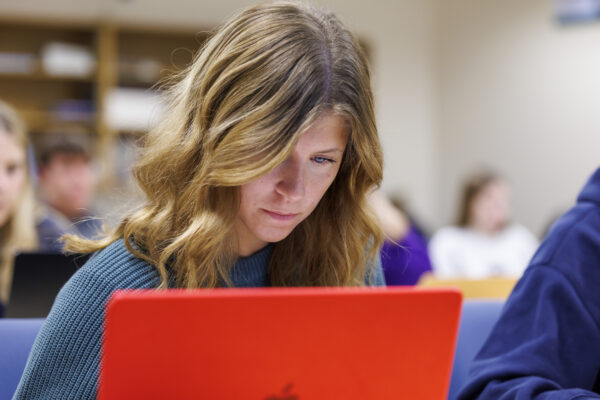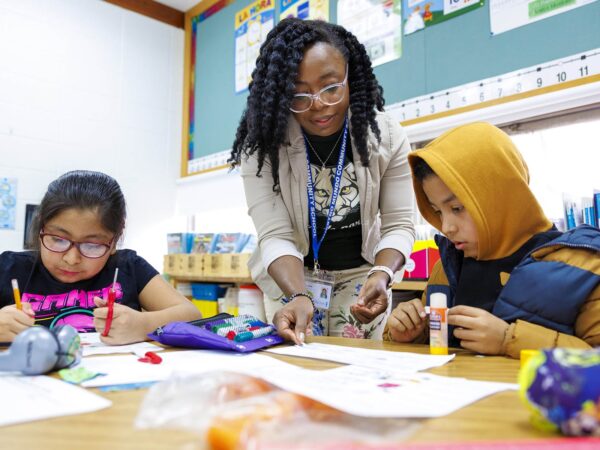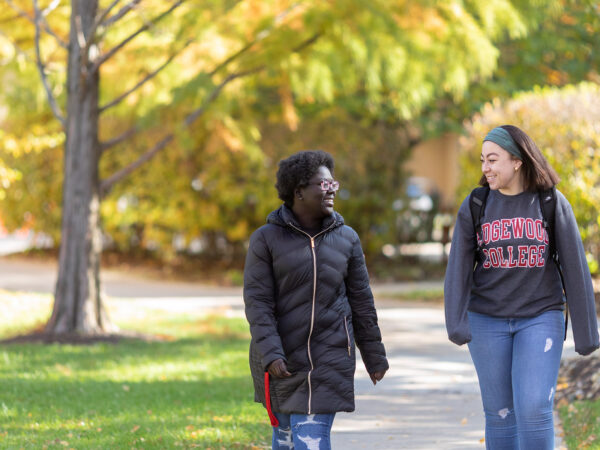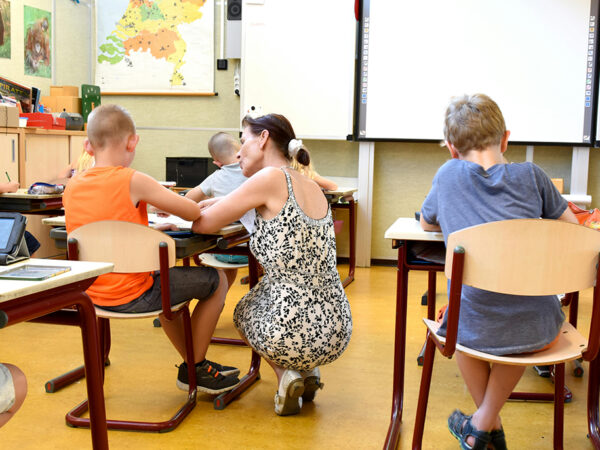Bachelor of Arts in Cross-Categorical Special Education – Degree CompletionHenry Predolin School of Nursing, Business, Education, and Health Sciences
Finish Your Degree,
Launch Your Teaching Career
Designed for Working Adults
Edgewood College’s Cross-Categorical Special Education Degree Completion Program empowers passionate individuals to make a meaningful impact on the lives of students with intellectual, emotional, and learning disabilities. Whether you’re a paraprofessional ready to advance your career or a returning adult learner pursuing a career in Elementary, Middle, or High School Special Education, this program offers a streamlined path to earning your bachelor’s degree and licensure.
Flexible and accessible, our program is tailored for working professionals. General education courses are available in accelerated, hybrid, and virtual formats, making it possible to learn on your schedule. Courses in the major are delivered as asynchronous, 8-week sessions, allowing you to access materials and complete assignments at your convenience.
Our program focuses on equipping you with the skills and knowledge essential for success in K-12 special education classrooms. Core courses include foundations of special education, assessment and intervention strategies, teaching methods for diverse learners, and classroom management. These are complemented by hands-on clinical fieldwork and a supervised full-time student teaching semester, ensuring you’re fully prepared for licensure. With as few as 39 credits required for the initial licensure sequence, you can achieve your goal of becoming a licensed special education teacher without compromising your current commitments.
Paraprofessional to Teacher
This pathway is designed for students who are 22 years of age or older or four years post high school graduation/GED achievement. The typical student will have completed some college coursework, allowing them to build on their previous education for a faster path to degree completion. Ideally, applicants should have a minimum of 24 college credits to help accelerate their academic journey. Alternatively, full time school district employment or having a contract to begin full time work at a school district can also qualify students for admission. For those just starting their college journey and without professional experience, Edgewood College offers a variety of undergraduate programs that provide a more suitable starting point.

Save Money – Save Time
With the alternative FoRT portfolio embedded in the required coursework, students will save the money and time needed to prepare for the traditional FoRT.
Madison, WI
Hybrid
120
Careers within Cross-Categorical Special Education
$65,910
Average annual salary for a Special Education Teacher
A bachelor’s degree in special education prepares you for a variety of career paths. Careers with an asterisk (*) may require additional education.
- Behavioral Analyst
- Elementary Teacher*
- English as a Second Language or Bilingual Education Teacher*
- Occupational Therapist*
- School Counselor*
- School Psychologist*
- Social Worker*
- Special Education Paraprofessional
Featured Courses
Degree Completion Education 363 Development & Disability – Child & Youth
This course examines the physical, cognitive, social, and emotional development of children and youth, with a comprehensive overview of differences and exceptionalities identified in high and low incidence areas of disability. Theories and issues of childhood related to social, emotional, intellectual, physical, and moral development and learning will be applied and analyzed, as well as the promotion of health and wellness, conflict resolution, and knowledge of mandatory reporting requirements. The historical and legal foundations of cross categorical special education are explored, including major federal legislation (IDEA, ADA, and Section 504), state rules and policies (PI 34 and Child Find), referral processes, and collaboration between general and special education. Knowledge and skills related to the history and basic components of inclusive learning environments, specific characteristics of each disability area, the implications of atypical childhood, and the lifelong effects of each disability are emphasized. A practicum experience will enable candidates to demonstrate abilities to work with children and youth of all backgrounds.
Degree Completion Education 401 Teacher as Inquirer
This course introduces students to a number of trends in qualitative educational action-based research, critically examining relevant paradigms and methods. Ethical obligations of doing research are emphasized. Throughout this COR3 course, students will be challenged to think about who they are as educators and individuals, as well as the needs and opportunities of the world related to education, and how research can work toward building a more just and compassionate world.
Degree Completion Education 412 Assessment & Analysis of Disability
This course examines and builds understanding of academic, language, behavior, and social assessment practices. Skills of data collection, interpretation, and analysis of summative and formative assessment data in academic, social, emotional, and adaptive Learning areas are applied to determination of disability and to IEP goal progress monitoring.
Student Organizations
The Aspiring Teachers Club welcomes all students enrolled in, or preparing to study, in the Division of Education at Edgewood College. Their mission is to prepare students for careers in the education field by providing members with opportunities to enhance their understanding of the profession. They accomplish this by engaging members with opportunities to participate in professional development and community service activities, both on- and off-campus. Their commitment extends to fostering a warm, inclusive, and fun environment, creating a vibrant student community within the Division of Education.
Accreditation
The Teacher Education licensing programs are approved by the Wisconsin Department of Public Instruction (WDPI). Edgewood College is accredited by the Higher Learning Commission.
A Tradition of Excellence in Educating Educators
At Edgewood College, education has always been at the heart of our mission. Since granting our first BA in Education degrees in 1940, we’ve built a reputation of preparing exceptional educators. Today, we continue this legacy by expanding opportunities for paraprofessionals to achieve their professional goal of becoming licensed teachers. This effort not only fosters educational equity but also increases the diversity of teachers in classrooms, aligning with our vision to create equity in education.
Faculty Spotlights

Dr. Kyle Harrison-Woods
Coordinator and Assistant Professor
kharrisonwoods@edgewood.edu
Shaping the Future of Education
ESL and Bilingual Add-Ons
Our program is rooted in the belief that paraprofessionals bring valuable, real-world classroom experience that can be harnessed to strengthen K-12 education. Our approach integrates their current roles into their educational journey, allowing them to fulfill clinical practicum requirements through their ongoing work in schools. With options to pursue licensure in English as a Second Language (ESL) or Bilingual Education, the pathway prepares candidates to meet the growing needs of diverse student populations while opening new career opportunities for themselves.
Student Teaching: Expand Your Skills
Madison and its neighboring communities offer a diverse array of practicum and student teaching placements, including private, parochial, and public schools in both urban and suburban areas. Having diverse options provides you with a broader range of experiences, which facilitates exploration to help you discover the best fit, enhancing both your skills and marketability.
Empowering Educators for Equity and Inclusion
The Division of Education mission is to cultivate future educators dedicated to anti-racist work that embraces and empowers every student. We do this by grounding our work in the core values of Edgewood College and providing teaching that is culturally and linguistically sustaining. This pursuit of equity extends inward, fostering a culture of inclusivity within us, our division, our students, and outward to the communities we influence.
We envision candidates seeking licensure and education degrees as practitioners who are both reflective and effective. Our commitment is to nurture professionals devoted to continuous growth through ongoing professional development, cultivating the knowledge, skills, and dispositions essential for promoting equity in every classroom and school.
Frequently Asked Questions
What if I’m not currently a Paraprofessional?
This program is designed with working paraprofessionals in mind, but it is not a requirement. Full time school district employees or those under contract to begin full time work at a school district are eligible for admission, regardless of whether they have earned any higher education credits. Adults not in a school district role are also encouraged to apply if they are 22 years of age or older or four years post high school graduation/GED achievement and if they have completed higher education coursework, with a preference for a minimum of 24 credits. We will also consider special situations or circumstances; applicants should address these in a personal statement.
For students just beginning their college journey without prior professional experience, Edgewood College offers a variety of undergraduate programs that provide a more suitable starting point.
How many entry points are available for this pathway?
We’re pleased to offer five entry points throughout the academic year, giving new students flexibility in starting their journey. Please refer to the academic calendar for specific start dates.
- Fall Session I
- Fall Session II
- Spring Session I
- Spring Session II
- Summer Session
Yes, students must maintain a minimum 2.75 GPA to qualify for teacher licensure.
I speak another language; can I get a bilingual license?
Yes! To obtain a bilingual license, you’ll complete the ESL K-12 licensure pathway add-on (see above) and then take one additional course and demonstrate proficiency in your target language. Your proficiency is validated through passing the American Council on the Teaching of Foreign Languages (ACTFL) exam during your senior year.
What is the FoRT test, and will I be required to take it?
The Foundations of Reading Test (FoRT) assesses a teacher’s proficiency and depth of understanding of students’ reading and writing development. Candidates in the Cross-Categorical Special Education Degree Completion pathway will complete our DPI-approved FoRT alternative portfolio, which demonstrates these competencies through your coursework. Students in this pathway will not be required to take the standard FoRT.
What should I expect during Student Teaching?
Student Teaching is a supervised instructional experience designed to prepare you to meet the academic needs of your students. It spans a full semester (a minimum of 16 weeks), requiring full-time participation (minimum 40 hours per week). You will be actively involved in teaching every day, including two lead weeks in the classroom. If you’re already working in a K-12 educational institution, your current district can often serve as the clinical site for your student teaching practicum.
What level of support do students receive in this major?
Our Education programs emphasize hands-on learning, with engagement in K-12 classrooms starting in your sophomore year, supported by experienced practicum teachers. To ensure your success, a dedicated team of instructors, advisors, and administrators is committed to providing direct support throughout your academic journey, with small classes that enable instructors to center on individual needs to guide your progress through the program.


